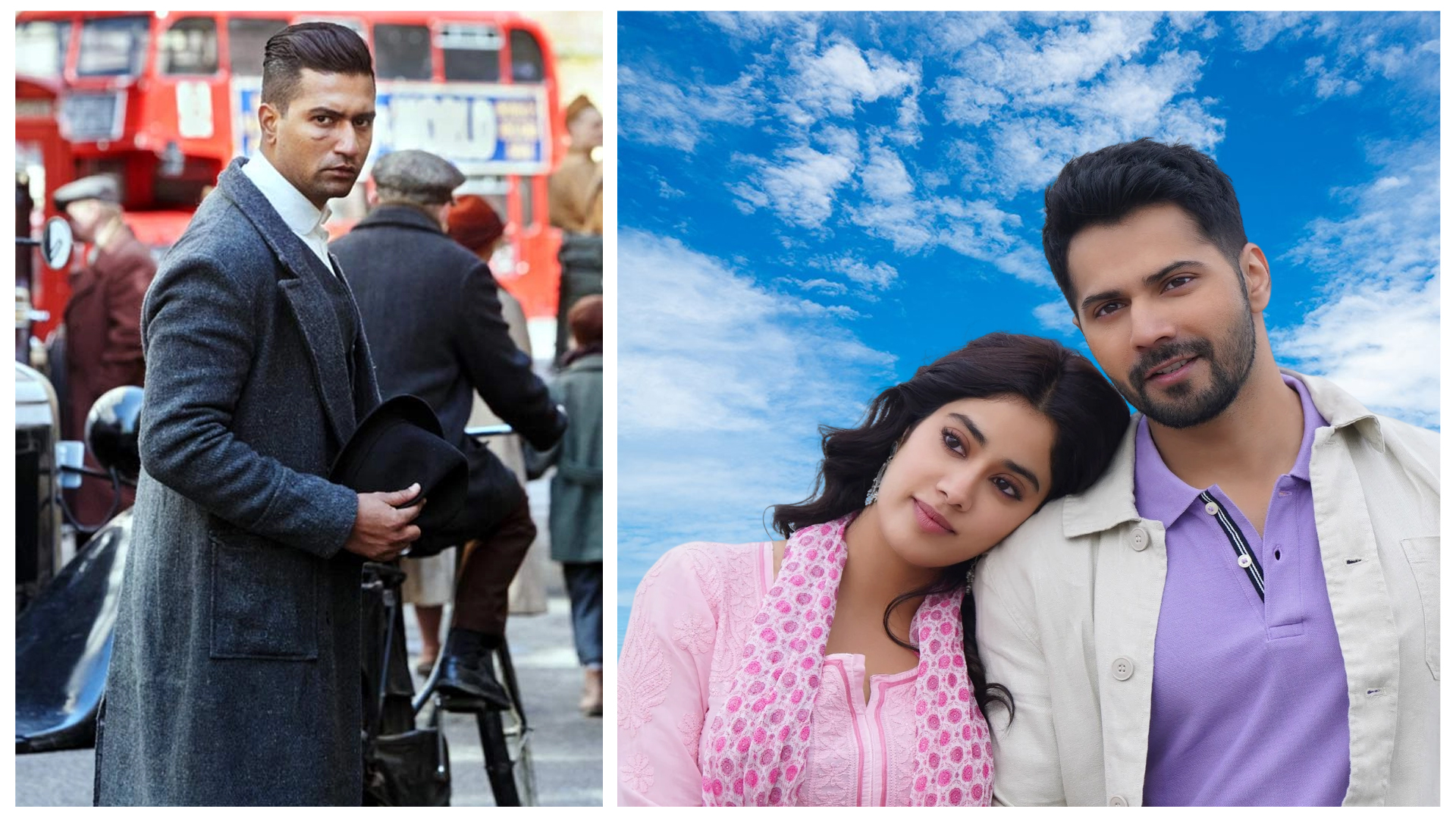In a recent interview, renowned director Nitesh Tiwari shed light on the controversial use of World War II imagery in his upcoming film, Bawaal. He also revealed the changes made to the script following the release of Shoojit Sircar’s Sardar Udham, which prompted the removal of a reference to the Jallianwala Bagh massacre. Tiwari’s decision to keep the context of World War II in Bawaal has sparked intrigue and discussion among viewers. In this blog post, we will delve into Tiwari’s thoughts on incorporating historical events in his film and the significance of his creative choices.
The Bawaal Trailer and Its Historical Context
The trailer of Bawaal introduces us to a small-town couple played by Varun Dhawan and Janhvi Kapoor. Their characters embark on a journey to Europe, where they explore iconic World War II locations such as Paris. Throughout the trailer, the couple references the war, creating a parallel between their love story and the global conflict. The utilization of World War II imagery as a recurring motif has left audiences intrigued and curious about the film’s narrative.
Nitesh Tiwari’s Perspective
In an interview with Galatta Plus, Nitesh Tiwari addressed the use of Holocaust imagery in Bawaal. He acknowledged the potential controversy surrounding this creative choice and explained that he deliberately avoided incorporating historical events from Indian history, including the Jallianwala Bagh massacre. Tiwari emphasized his desire to offer something fresh and unique to the audience, both in terms of storytelling and visual representation.
Tiwari’s Decision to Remove the Jallianwala Bagh Reference
Tiwari revealed that one of the earlier drafts of the Bawaal script contained a reference to the Jallianwala Bagh massacre. However, after the release of Sardar Udham, a film that focused on the life of freedom fighter Udham Singh and his connection to the Jallianwala Bagh tragedy, Tiwari decided to remove the reference. He believed that including it would no longer bring a sense of novelty to the screen. This creative decision highlights Tiwari’s commitment to delivering fresh narratives and avoiding repetition.
Exploring Human Greed through World War II Metaphor
Janhvi Kapoor, in the same interview, revealed that the metaphor of World War II in Bawaal was connected to the theme of human greed. The film uses this historical backdrop to depict the consequences of greed in a contemporary love story. By drawing parallels between the destructive power of war and the destructive nature of human desires, Tiwari aims to engage viewers in a thought-provoking exploration of universal themes.
Respectful Use of Holocaust Imagery
Tiwari addressed the concerns surrounding the use of Holocaust imagery in Bawaal. He clarified that only two shots of the Holocaust were shown in the trailer to avoid spoiling the storyline. Tiwari assured the audience that these scenes were handled with respect and held significant meaning within the film’s narrative. By presenting a limited glimpse of the Holocaust, Tiwari maintains the intrigue while respecting the sensitivity of the subject matter.
Exploring the Context of World War II
Nitesh Tiwari’s decision to set Bawaal against the backdrop of World War II opens up an array of possibilities for storytelling and character development. The historical context of the war provides a rich tapestry of emotions, struggles, and societal transformations that can be seamlessly woven into the narrative. By immersing the characters in this global conflict, Tiwari has the opportunity to explore themes of resilience, sacrifice, and the human capacity for love and compassion in the face of adversity.
Cinematic Visuals and Historical References
One of Nitesh Tiwari’s strengths as a director is his ability to create visually stunning and immersive cinematic experiences. With Bawaal, he has the chance to showcase his expertise in recreating historical settings and evoking the essence of a particular era. By incorporating references to World War II, Tiwari not only adds depth to the story but also offers a visual treat for the audience. The meticulously crafted sets, costumes, and attention to detail contribute to the overall authenticity of the film.
The Impact of Sardar Udham’s Release
The release of Shoojit Sircar’s Sardar Udham, starring Vicky Kaushal, had a profound impact on Nitesh Tiwari and influenced his decision-making process regarding the inclusion of certain historical references in Bawaal. Sardar Udham delves into the story of Udham Singh, who sought revenge for the Jallianwala Bagh massacre. The critical acclaim and success of Sardar Udham prompted Tiwari to reconsider the inclusion of Jallianwala Bagh in his film, as he wanted to maintain the freshness and originality of his storytelling.
Narrative Innovation and Audience Engagement
By consciously avoiding well-trodden paths and familiar historical events, Nitesh Tiwari aims to offer the audience a unique and fresh perspective. He recognizes the abundance of films that have covered India’s historical wars and believes that bringing something new to the screen is essential to captivate the audience’s attention and keep them engaged. Tiwari’s commitment to narrative innovation and his desire to push creative boundaries ensure that Bawaal stands out amidst the multitude of films tackling historical themes.
Critical Analysis and Social Commentary
Bawaal provides an opportunity for Nitesh Tiwari to offer insightful social commentary by juxtaposing a love story against the backdrop of World War II. The use of historical events as metaphors allows him to explore broader societal issues and human nature. Tiwari can delve into the themes of power, oppression, and the destructive consequences of unchecked desires. Through the lens of a contemporary love story, Bawaal offers a platform for critical analysis and reflection on the complexities of human behaviour.
Exploring Love and Resilience Amidst Turmoil
The choice to intertwine a love story with the tumultuous backdrop of World War II allows Nitesh Tiwari to explore the resilience of human relationships in the face of adversity. The characters in Bawaal, portrayed by Varun Dhawan and Janhvi Kapoor, navigate their journey against the backdrop of a global conflict. By highlighting their love and determination to stay together amidst the chaos, Tiwari showcases the indomitable spirit of human connection and the strength that can be found even in the darkest of times.
The Significance of Historical Context in Character Development
By placing the characters within the historical context of World War II, Nitesh Tiwari provides a unique opportunity for their growth and transformation. The war catalyzes change, pushing the characters to confront their fears, overcome challenges, and discover their true selves. The historical setting adds depth to their arcs, allowing the audience to witness their evolution as individuals and as a couple in the face of extraordinary circumstances.
Addressing Universal Themes through Historical Symbolism
The use of historical events and imagery in Bawaal allows Nitesh Tiwari to address universal themes that transcend time and place. World War II, with its inherent themes of conflict, sacrifice, and human resilience, serves as a symbol for the broader struggles and triumphs experienced by individuals in their personal lives. By weaving these universal themes into the narrative, Tiwari creates a relatable and emotionally resonant story that resonates with audiences on a deeper level.
Honouring the Memory of Historical Events
While Bawaal does not explicitly delve into specific historical events like the Jallianwala Bagh massacre, the decision to remove the reference shows Nitesh Tiwari’s sensitivity towards honouring the memory of such significant moments in history. By avoiding the potential dilution or exploitation of these events for mere entertainment purposes, Tiwari ensures that the focus remains on the central narrative and the human experiences at the heart of the film.
Creating Dialogue and Cultural Exchange
The inclusion of World War II in Bawaal opens up avenues for dialogue and cultural exchange. It sparks interest in history and encourages viewers to learn more about the events that shaped the world. By creating curiosity and prompting discussions, the film becomes a catalyst for education and cultural understanding. It serves as a reminder of the importance of acknowledging and appreciating our shared history, regardless of geographical boundaries.
The Symbolism of World War II as a Catalyst for Change
The use of World War II as a backdrop in Bawaal symbolizes the transformative power of significant historical events. Just as the war brought about sweeping changes on a global scale, the characters in the film undergo personal transformations as they confront their inner conflicts and navigate the challenges presented by the war. This symbolism allows viewers to reflect on the impact of historical events on individual lives and the potential for growth and resilience in the face of adversity.
Exploring the Complexity of Morality and Ethical Choices
World War II was marked by complex moral dilemmas and ethical choices. By incorporating this historical context into Bawaal, Nitesh Tiwari provides an opportunity to delve into the intricate shades of morality. The characters may face difficult decisions that test their integrity, challenging them to choose between self-preservation and doing what is right. This exploration of moral ambiguity adds depth to the narrative and prompts viewers to contemplate the choices individuals make in times of crisis.
Highlighting the Human Cost of War
The portrayal of World War II in Bawaal serves as a poignant reminder of the human cost of war. Through compelling storytelling and emotional performances, the film brings to life the personal stories and sacrifices made by individuals during this tumultuous period. By humanizing the war’s impact, Tiwari fosters empathy and encourages audiences to reflect on the universal experiences of love, loss, and resilience that emerge from times of conflict.
Relevance to Contemporary Sociopolitical Issues
Although set in the past, Bawaal’s exploration of World War II holds relevance to contemporary sociopolitical issues. The film offers an opportunity to draw parallels between historical events and present-day challenges, inviting viewers to contemplate the enduring themes of power, prejudice, and the consequences of unchecked nationalism. By encouraging reflection on the lessons of history, Bawaal prompts us to critically examine our society and consider how we can avoid repeating past mistakes.
The Power of Love and Compassion in Times of Crisis
Amidst the chaos and devastation of war, Bawaal shines a light on the power of love and compassion to transcend barriers. The film portrays how relationships can flourish and endure even in the most challenging circumstances, highlighting the resilience and strength that arise from genuine connections. By emphasizing the importance of empathy and human connection, Bawaal serves as a reminder of the transformative and healing power of love, both on an individual and societal level.
Conclusion
Nitesh Tiwari’s Bawaal is a cinematic venture that takes viewers on a captivating journey by intertwining a contemporary love story with the backdrop of World War II. Tiwari’s decision to explore the historical context of the war brings depth, resonance, and visual grandeur to the film, while also allowing for the exploration of universal themes and character development.
The incorporation of World War II symbolism in Bawaal serves as a catalyst for change, both on a personal and societal level. The characters, portrayed by Varun Dhawan and Janhvi Kapoor, undergo transformative journeys as they confront their fears, overcome challenges, and discover their true selves amid a global conflict. The war becomes a powerful metaphor for the trials and triumphs experienced by individuals in their personal lives, showcasing the indomitable spirit of human connection and resilience.
One notable aspect of Nitesh Tiwari’s approach is his commitment to narrative freshness and originality. By avoiding the inclusion of well-trodden historical events, such as the Jallianwala Bagh massacre, Tiwari ensures that Bawaal offers a unique perspective to audiences. This decision was influenced by the release of Sardar Udham, which focused on the historical significance of Jallianwala Bagh. Tiwari’s conscious choice to remove the reference demonstrates his sensitivity and respect for honouring the memory of such significant moments in history, while also maintaining the film’s narrative integrity.
Through Bawaal, Tiwari creates a platform for dialogue, cultural exchange, and critical analysis. The film sparks interest in history and encourages viewers to delve deeper into the events that shaped the world. By creating curiosity and prompting discussions, Bawaal becomes a catalyst for education and cultural understanding. It serves as a reminder of the importance of acknowledging and appreciating our shared history, fostering empathy and promoting cross-cultural conversations.
The film’s exploration of themes such as love, resilience, moral ambiguity, and the human cost of war resonates deeply with audiences. Bawaal prompts viewers to reflect on the complexities of morality and ethical choices, highlighting the transformative power of love and compassion in times of crisis. By drawing parallels between historical events and contemporary sociopolitical issues, the film urges us to critically examine our society and learn from the lessons of the past.
Nitesh Tiwari’s Bawaal showcases his expertise in creating visually stunning and immersive cinematic experiences. The meticulous attention to detail in recreating historical settings, costumes, and the overall ambience of the era adds to the authenticity and grandeur of the film. Through captivating storytelling, emotional performances, and thought-provoking visuals, Tiwari creates an immersive experience that captivates and engages the audience.
As Bawaal prepares for its release, audiences eagerly anticipate the opportunity to witness Nitesh Tiwari’s unique storytelling vision on the big screen. The film promises to transport viewers to a world where love, resilience, and compassion prevail amidst the chaos and destruction of war. By exploring the historical context of World War II, Bawaal invites us to reflect on our shared humanity, the enduring themes of the past, and the potential for positive change in the present and future.
In conclusion, Nitesh Tiwari’s Bawaal is a cinematic masterpiece that seamlessly combines a love story with the historical backdrop of World War II. The film’s exploration of universal themes, narrative freshness, and visual grandeur offer audiences a captivating and thought-provoking experience. Through relatable characters, poignant storytelling, and sensitive handling of historical references, Bawaal encourages us to reflect on the power of love, resilience, and empathy in times of crisis. As the film prepares to grace screens, it promises to leave a lasting impact, inspiring viewers to delve into the complexities of our shared history and embrace the transformative potential within us all.








0 Comments